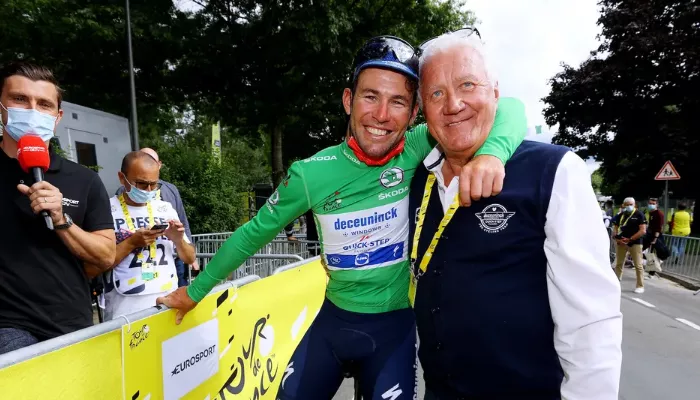After over 40 years in cycling management, Patrick Lefevere is set to depart from his role as CEO of Soudal Quick-Step, the team he has helmed for the past 22 years. His decision to step down, announced earlier this month, marks the end of an era for one of the most influential figures in modern cycling.
Lefevere’s career began in 1979, the year Margaret Thatcher became the UK Prime Minister, a time of Cold War tensions and geopolitical change. From those early days in a very different world, Lefevere has shaped one of the most successful teams in the sport’s history. Under his leadership, Quick-Step became a powerhouse, winning 981 races on the WorldTour, a record for any team in the era, according to ProCyclingStats. For 11 years, Quick-Step won more races than any other team, solidifying its place at the pinnacle of cycling.
Perhaps one of his most notable achievements is the team’s dominance in the Classics. Over his tenure, Quick-Step won 22 Monument races, including an impressive eight editions of the Tour of Flanders, earning a reputation as the team to beat in the one-day races. Lefevere’s stewardship also saw Quick-Step’s transition into a general classification (GC) team, with Remco Evenepoel emerging as the new face of the squad. Evenepoel’s victory in the 2022 Vuelta a España marked the team’s first Grand Tour win, further cementing Lefevere’s legacy. The team also claimed 124 Grand Tour stage wins during his tenure.
Throughout his career, Lefevere managed some of the biggest names in cycling, including Tom Boonen, who won 120 races for Quick-Step, Mark Cavendish (59), Julian Alaphilippe (42), Paolo Bettini (42), and Evenepoel (57). Lefevere also worked with legendary riders like Johann Museeuw, who won 43 races under his guidance during their time together at Mapei and Quick-Step.
Museeuw praised Lefevere’s tactical brilliance and his ability to manage high-profile riders. “Tactically, he was a very good sports director. You don’t have to be a special rider to be a very good sports director. He knew how to win bike races and control the team, even when there were a lot of big riders,” Museeuw said. “He had a special way to motivate the riders.”
Brian Holm, who worked alongside Lefevere as a sports director from 2012 to 2022, highlighted Lefevere’s bold approach to team management. “What I always liked about Patrick was that he was never afraid to gamble a bit and take some chances,” Holm explained. One of the most notable examples was Lefevere’s decision to re-sign Mark Cavendish in 2021, a move that was initially met with skepticism but ultimately led to Cavendish’s resurgence as a star sprinter. “People spoke about it like it was a big joke, but Patrick was determined to give Mark a chance again,” Holm recalled.
Despite his successes, Lefevere’s approach to management was not without controversy. He was often outspoken, publicly criticizing riders like Sam Bennett, Alaphilippe, and Kasper Asgreen in sometimes harsh language. In a rare public misstep, he was forced to apologize earlier this year after making derogatory comments about women, which led to a warning from the UCI.
Holm described Lefevere as a “big boss” who made the rules and ensured his team operated according to his vision. “Patrick always had your back too,” Holm said. “He’d say the press don’t control my team, I do. He really cares about his staff.” However, as the team evolved and focused more on GC pursuits, particularly with Evenepoel’s rise, some observers felt that Quick-Step was drifting away from its traditional identity as a Classics-oriented team.
As Quick-Step pivots into this new phase, many believe it may be time for Lefevere to step away. Museeuw, reflecting on Lefevere’s departure, said, “It will be quite difficult for the team without him. His knowledge and insight, built over four decades at the highest level, are irreplaceable.”
Lefevere’s tenure has undoubtedly left an indelible mark on the sport. While his departure signals the end of an era for Quick-Step, his influence on cycling will continue to resonate, both within the team and throughout the broader world of professional cycling.
Related topics
- Lael Wilcox’s Next Challenge: The Iditarod Trail
- Hannah Roberts Wins Fifth Straight BMX Freestyle World Title
- Is Van der Poel’s “Zone 2” Hurting Cyclocross?

